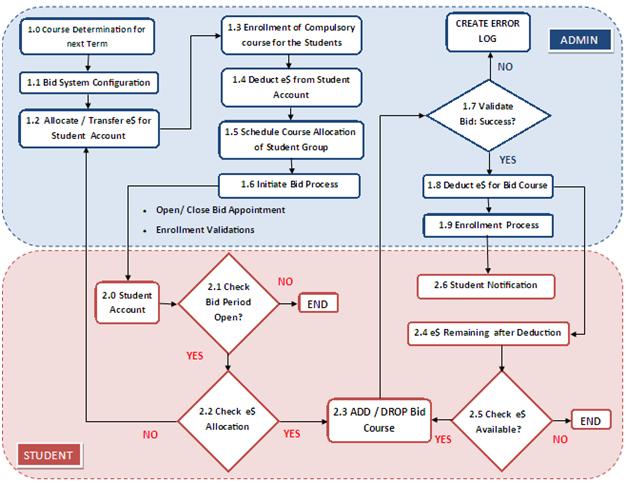This website uses cookies. By continuing to browse the site, you are agreeing to our use of cookies
The Adventures of Course Bidding in Higher Education
Overview
Universities are always faced with unique challenges. One such challenge is when many students want to enroll in the same course (Popular Courses). And since the capacity for each course is fixed, the university sought after a solution to satisfy their student’s aspiration. Universities always came back with innovative solutions to such challenges that would benefit all its constituents. Bidding System was one of their innovations towards creating a transparent system for Course selection and Course Enrollment.
Some of the countries like Singapore and Malaysia offer students a feature to bid for courses they would like to enroll in for the current & next semesters. By doing this universities provided a transparent method for the students with good metrics to bid for course of their liking to fulfill their career dreams. Below is an extract on how we enabled our campus customers with customized solutions for their bidding requirement.
Process Flow – Bidding System

The Bidding System:
Before the commencement of each term, students are required to enroll in their courses via Course Bidding System.
Bidding system is the system for registration of courses for every term. Bidding system empowers students with the choice of selecting courses for their own curriculum using two types of currency known as e-dollars (e$).
Students should take note of academic advisement issued by their schools on the course(s) that they should enroll in according to their specific term and year of study.
Based on available resources in the form of e-Dollars (e$), students will need to make their choice by carefully considering the demand and supply of the courses/workshop as well as their academic study plan not just for the current term but also the future terms.
Terminologies used:
Bidding System Currency: “e-Dollars (e$)”: “e-Dollars (e$) is the currency used to bid for courses during the course bidding exercise conducted each term. Each freshman student will be allocated e-Dollars (e$) and Senior students will be transferred pervious term’s e-dollars, if any, in addition to new e-dollars that are allocated for the current term. E-dollars allocate/transfer/both before the start of each bidding cycle.
Total Course Units (CUs) Allowed for Courses: Each student on good academic standing can submit bids of up to 6.5 course units and enroll up to 5.5 course units per term, in Term 1 and Term 2. In Term 3, students can submit bids of up to 3 course units and enroll up to 2 course units per term, in Term 3A and Term 3B.
Pre-Assigned & Biddable Courses: The pre-assignment of courses will only be done for freshmen when they are first admitted into the University. Students are advised to enroll into 4 to 5 course units (CUs) in their first term of study. Bidding is not required as students will be assigned to a Special Groups.
Dropping of Pre-assigned Classes: Should note that all pre-assigned courses are non-droppable.
Bidding for Courses in Biddable rules: As a general rule, freshmen are only able to bid for courses that are within the biddable basket during the bidding cycles.
DICE – Drop If Course Exceeds: When a student submits bids for more than 5.5 CUs (ie. max of term enrolment limit), bidding system will prompt the student to indicate the course that he/she wishes to drop should all the bids be successful. This is known as DICE – Drop If Course Exceeds.
Processing of Bids
In processing the bids, the allocation of available vacancies for each course / section will be based on the bids received, starting with the highest bid until either (i) all available vacancies are filled or (ii) there are no more bids for the course / section.
The e-Dollars (e$) will only be deducted from the student’s account if the bid is successful. The amount of e-Dollars (e$) to be deducted is equivalent to the stipulated bid price submitted by the student for that bidding round.
Tie Bids: In the event of a tie bid (tie bid occurs when the number of students submitting the same exact e$/e-pt bid for a section exceeds the number of vacancies available), the system will award the bid to the student who placed his/her bid on the first-come-first-served basis (on the basis of server time). Hence, students are advised to place the bids early to increase the probability of getting the bids.
Enrolling of Course Outside of Bidding System: Under exceptional or extenuating circumstances, a school may require that enrolment for a particular course is to be done off-line (i.e. outside of Bidding system). Students who need to enroll for the affected course would have to seek the school’s permission to be enrolled in the course.
Outcome of bidding process:
The Major advantage to the student is in terms of the Independence in choosing a course of his choice. The options are wide open to him and he may choose or bid for any course of his choice without any restrictions. Being a very transparent Process, he measures his success rate in getting a course and makes well informed and wise decisions.
From the Admin’s perspective, the time taken for Enrollment is very low, as the enrollment results are based on successful bids. The Student is well informed about the automated process and hence the Support from the Admin to the Student is very low.
And finally from the Management point of view, the Management gets to know about the Course Weightages from the Students perspective and can give better choices to the Student every term. The Dashboards and Reports help the management boost the morale of the Student from an Academic Standpoint offering as many good choices as possible.
Related Blogs

Why AI and Automated Workday Testing Will Be Essential for Businesses in 2025
- Enterprise Platform Services

Workday Post-Go-Live Testing: Why It’s Critical for System Stability
- Enterprise Platform Services

Transforming Manufacturing Sales: From Complexity to Simplicity with CPQ for Manufacturing
- Manufacturing

SAP S/4HANA Migration Strategy: Brownfield vs. Greenfield vs. Hybrid Approach
- Enterprise Platform Services

S/4HANA Implementation Best Practices: Lessons from Enterprise Deployments
- Enterprise Platform Services

SAP Databricks: Transforming ERP Challenges into Opportunities
- Enterprise Platform Services

7 Reasons for Shifting Your Legacy ERP to the Cloud
- Enterprise Platform Services

Ready to Pursue Opportunity?
Every outcome starts with a conversation










